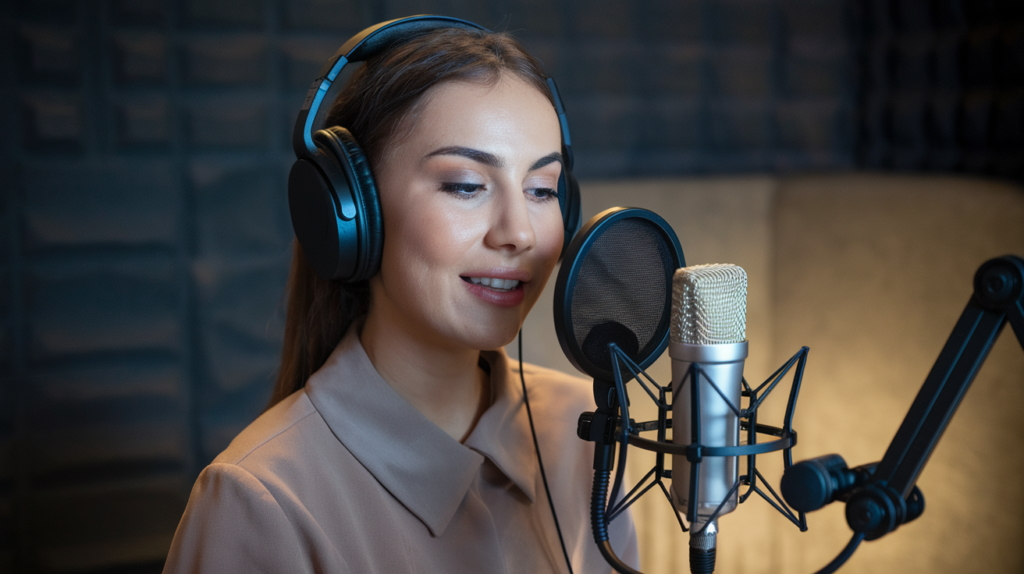When you think of voiceovers, what often comes to mind are polished accents and universal appeal. But in Bulgaria, the rich tapestry of regional dialects adds an intriguing layer to this art form. From the melodic tones of the Rhodope mountains to the sharp intonations found in Northern Bulgaria, these dialects bring authenticity and cultural depth that can elevate any project.
In a world where localization is key, understanding how these regional nuances affect voiceovers is essential. You’ll discover how capturing local flavor not only enhances storytelling but also resonates with audiences on a deeper level. Join us as we explore the vibrant landscape of Bulgarian dialects in voiceover work and uncover their significance in connecting with viewers across borders.
Key Takeaways
- Rich Regional Diversity: Bulgarian regional dialects enhance voiceovers by providing authenticity and cultural depth, crucial for storytelling in media.
- Historical Influences: The evolution of these dialects is rooted in Bulgaria’s history, shaped by geographical and social factors that influence their unique characteristics.
- Key Characteristics: Understanding phonetics, vocabulary, intonation patterns, and grammar nuances of each dialect is essential for selecting the right voice talent.
- Audience Engagement: Utilizing local accents fosters emotional connections with viewers, enhancing relatability and trust through familiar sounds.
- Challenges in Implementation: Navigating linguistic variations and audience perceptions is vital to ensure clarity and acceptance of regional dialects in voiceover projects.
- Future Trends: Advancements in technology and evolving cultural expectations emphasize the importance of authenticity in voiceovers, encouraging the integration of diverse regional accents.
Overview of Regional Bulgarian Dialects
Regional Bulgarian dialects play a crucial role in voiceovers, adding depth and authenticity to projects. These dialects reflect the rich cultural tapestry of Bulgaria, enhancing storytelling through unique sounds and expressions.
Historical Context
Bulgarian dialects evolved from historical influences, with roots tracing back to the Slavic migrations and Ottoman rule. Each region developed distinct linguistic features shaped by geography, social structures, and cultural interactions. The historical context fosters a diverse range of accents that voice actors can leverage to create authentic characters or narratives.
Characteristics of Dialects
Each regional dialect possesses specific characteristics that differentiate it from others:
- Phonetics: Variations in pronunciation influence the overall sound quality in voiceovers.
- Vocabulary: Unique terms enrich dialogue authenticity; for instance, certain words may be exclusive to particular regions.
- Intonation Patterns: Melodic tones or sharp intonations impact emotional delivery during performances.
- Grammar Nuances: Subtle grammatical differences contribute to dialogue’s natural flow.
Understanding these characteristics helps you select the appropriate voice talent for your project, ensuring that local flavors resonate effectively with audiences.
Importance of Voiceovers in Bulgaria
Voiceovers play a crucial role in various media and entertainment sectors within Bulgaria, enhancing the overall quality and impact of productions. They contribute significantly to localization efforts, ensuring content resonates with local audiences by reflecting regional dialects.
Role in Media and Entertainment
Voiceovers are integral to film, television, advertising, and online content. Utilizing diverse voice talent enriches narratives and creates authentic connections with viewers. For instance, using a voice actor who embodies the local dialect can enhance character authenticity in animated films or commercials. This practice not only improves engagement but also boosts audience relatability.
Cultural Significance
Voiceovers embody cultural nuances that reflect Bulgaria’s rich linguistic heritage. Each regional accent carries historical significance and emotional depth, allowing stories to resonate on a personal level. By capturing these unique dialects through skilled voice artists, projects celebrate Bulgarian culture while appealing to broader audiences. Understanding these cultural elements ensures that your projects stand out by honoring local traditions and fostering greater viewer connection.
Analysis of Regional Bulgarian Dialects in Voiceovers
Regional Bulgarian dialects significantly influence the effectiveness of voiceovers. Understanding these dialects enhances storytelling and ensures that content resonates with local audiences.
Popular Dialects Used
Various regional dialects feature prominently in voiceover work across Bulgaria. These include:
- Rhodope Dialect: Known for its melodic tones, this dialect brings warmth and emotion to narratives.
- Northern Bulgarian Dialect: Characterized by sharper intonations, it adds a sense of urgency and clarity to projects.
- Shopluk Dialect: Offers a unique rustic charm, often used in folk stories or cultural portrayals.
- Thracian Dialect: Provides distinct phonetic characteristics, enriching historical and traditional narratives.
Selecting the right voice talent familiar with these dialects ensures authenticity and enhances audience connection.
Impact on Audience Engagement
Using regional accents in voiceovers directly impacts audience engagement. When viewers hear familiar sounds from their regions, they feel a stronger emotional connection to the content. This familiarity can lead to increased trust and relatability.
Voice over talent skilled in specific dialects captures nuances that resonate deeply with local demographics. For instance:
- Cultural Relevance: Authenticity fosters appreciation for cultural heritage, making stories more compelling.
- Enhanced Relatability: Viewers relate better when hearing voices that reflect their own experiences and backgrounds.
Incorporating diverse regional accents elevates the overall quality of media productions while fostering connections between stories and audiences across Bulgaria.
Challenges in Using Dialects for Voiceovers
Using regional dialects in voiceovers presents unique challenges that can impact the effectiveness and quality of the final product. Understanding these challenges helps you navigate the complexities of voiceover projects more effectively.
Linguistic Variations
Linguistic variations across Bulgarian dialects create obstacles in achieving consistency and clarity. Each dialect has distinct phonetic features, vocabulary choices, and intonation patterns. These differences can lead to misinterpretation or confusion if not handled correctly. Ensuring that your selected voice talent is well-versed in the specific characteristics of a chosen dialect enhances communication efficiency and maintains narrative integrity.
Perception and Acceptance
Perception plays a critical role in how audiences receive voiceovers featuring regional dialects. While local accents evoke authenticity, they may also alienate some listeners unfamiliar with those variations. Balancing authenticity with broader appeal becomes essential when selecting voice artists for diverse projects. Consider conducting audience research to gauge acceptance levels for different dialects; this insight informs decisions regarding which accents resonate best with target demographics, ensuring your content reaches its intended audience effectively.
Future Trends in Voiceovers and Dialects
Future trends in voiceovers and dialects showcase an evolving landscape that emphasizes authenticity, technology, and cultural relevance. Understanding these trends enhances your approach to selecting voice talent for diverse projects.
Technological Advancements
Technological advancements greatly influence the voiceover industry. Innovations such as artificial intelligence (AI) and machine learning improve the ability to synthesize regional accents accurately. These technologies enable you to create realistic simulations of various dialects, broadening accessibility for clients seeking specific regional flavors. Additionally, remote recording solutions allow voice artists from different regions to collaborate seamlessly, offering a wider pool of voiceover talent at your disposal. Enhanced audio editing software ensures high-quality sound production that captures the nuances of each dialect effectively.
Evolving Cultural Landscape
The evolving cultural landscape shapes audience expectations regarding authenticity in voiceovers. As globalization increases exposure to diverse cultures, audiences increasingly seek relatable content that reflects their backgrounds. This shift encourages you to consider local dialects as vital components in storytelling across media platforms like film, television, and advertising. By incorporating various regional accents into your projects, you enhance relatability and foster deeper emotional connections with viewers. Staying attuned to cultural shifts allows you to select appropriate voice talent who can embody these dialects authentically while resonating with target demographics.
Integrating current trends in technology and culture into your voiceover strategies positions projects for success by ensuring they connect meaningfully with audiences while celebrating Bulgaria’s rich linguistic heritage.
Conclusion
Regional Bulgarian dialects play a vital role in voiceovers by adding depth and authenticity to your projects. Embracing these unique accents not only enhances storytelling but also fosters emotional connections with audiences. As you navigate the world of voiceover work, understanding the historical context and phonetic nuances of each dialect will empower you to select the right talent for your needs.
The evolving landscape of technology offers exciting opportunities for capturing these dialects more accurately than ever before. By keeping audience preferences in mind, you’ll ensure that your content resonates while celebrating Bulgaria’s rich linguistic heritage. Adopting this approach can elevate your media productions and create lasting impressions on viewers globally.
Frequently Asked Questions
What is the significance of regional dialects in Bulgarian voiceovers?
Regional dialects add authenticity and cultural richness to Bulgarian voiceovers, enhancing storytelling by resonating deeply with local audiences. They reflect the country’s diverse linguistic heritage.
How do Bulgarian dialects impact audience engagement?
Using familiar sounds from regional accents fosters emotional connections and relatability, making stories more engaging for local demographics. This enhances the overall quality of media productions.
What are some popular dialects used in Bulgarian voiceover work?
Notable dialects include Rhodope, Northern Bulgarian, Shopluk, and Thracian. Each brings unique qualities to narratives, contributing to a richer storytelling experience.
What challenges arise from using dialects in voiceovers?
Dialect variations can lead to inconsistencies and misinterpretation if not carefully managed. Balancing authenticity with broader appeal is essential for effective communication.
How has technology influenced the future of voiceovers in Bulgaria?
Technological advancements like AI enable accurate simulations of regional accents and facilitate remote collaborations among voice artists, shaping the industry towards greater authenticity and cultural relevance.






